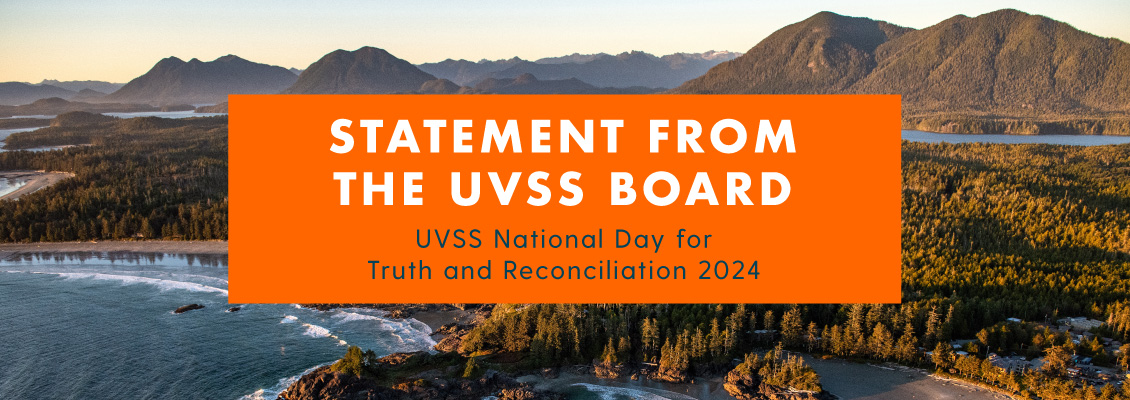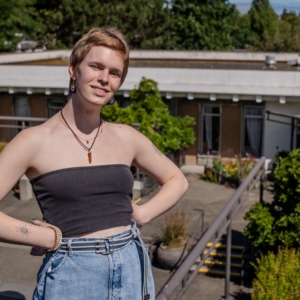Today is the National Day of Truth and Reconciliation. It was established to recognize the lives lost and those who survived residential schools in KKKanada. This day was started by Physllis Webstad, a residential school survivor from the Stswecem’c Xgat’tem First Nation. It is a day of reflection for both settlers and Indigenous Peoples in different capacities. This day for Indigenous Peoples is to reconnect with community, land and waters to hold space for the grief, trauma and generational wounds that KKKanada inflicts on Indigenous Peoples from the past and in the present. This day for settlers is a day of taking responsibility for their ancestors, for their government and for themselves. For Indigenous students, staff and community members this day is often heavy. The injustices of everyday life for Indigenous peoples cannot be explained in a statement nor can we rectify harm with our words. We hope that this statement shows our commitment to our values of Decolonization and Social Justice and you can discern the UVSS as a place that sees, feels, and hears your lived experience.
We want to recognize that the UVSS, as all colonial institutions are, is an imposition to the land of the Lək̓ʷəŋən (Songhees and Esquimalt) and WSÁNEĆ Peoples which we currently reside on. The UVSS stands in solidarity with Indigenous Peoples not only on Turtle Island but globally. We have to recognize that residential schools and the creation of KKKanada is intrinsically intertwined with globalization. The call for liberation of Indigenous peoples means liberation for ALL Indigenous peoples, here on Turtle Island and equally so lands on the other side of the world. Indigenous people must have complete control over decisions regarding their lands, resources, and governance. We recognize as an institution that true decolonization efforts and solidarity means we do not have security here. Our future as an organization on this land is not as important as the liberation of Indigenous Peoples on Turtle Island and globally.
As students working and studying adjacent to university structures, the UVSS Board acknowledges that our role within the education system is a product of the historical and ongoing violence of colonization.The first school system established in KKKanada was residential schools —therefore, what it means to learn and to teach in this country is rooted in the colonial project. UVic claims to be committed to decolonization while being an active participant in strengthening and continuing structures of colonialism. Many of the subjects that we learn today are stolen knowledge from Indigenous peoples or written from the perspective of a colonizer without proper credit to Indigenous Peoples or context for the ideas. We are not asking you to stop learning, but rather, to have deep reflections inside the classroom and seek teachers outside of the University of Victoria. The classroom has historically intentionally excluded Indigenous folks — those that know this corner of the world best — and in doing so, it has allowed us to forget our responsibility to, and respect for, what the true meaning of reconciliation is.
Colonization is not over, it is not abstract, and it is not arbitrary. In 2007, when the UN Declaration of the Rights of Indigenous Peoples (UNDRIP) was ratified, Canada was one of four countries to vote against its ratification. The UNDRIP affirms the rights of Indigenous people to autonomy, self-determination, and access to traditional lands. It took until 2021 for Canada to legally commit to adopting its principles, and a roadmap to do so was not released until 2023.
Colonialism is the foundation to all of our institutions. This includes our education system, but also other institutional systems, such as: the (in)justice system, healthcare, the environmental sector, and access to clean drinking water and food security. While these problems may seem huge and unshiftable to you, the key is to remember you can engage in decolonization through challenging colonial frameworks and mindsets. This could be as simple as challenging the language you use by exercising Indigenous place names, listening to Indigenous stories, learning Indigenous protocol, and building respectful relationships with the land and its original stewards. Before you change the world you must change yourself. We all have a unique and important role in decolonization regardless of your identity.
We invite settlers that are reading this to take time today to write, speak, or reflect on a self location. The act of self location is a refusal to accept colonialism and is the beginning step to understanding your unique role in how you came to be on this land. It requires settlers, for maybe the first time ever, to consider how they arrived here, why they are here, who they share space with and what that means for others. It is to learn about yourself then use that knowledge to inform how you move through this space and your relationships with the land, the people, and decolonization. The UVSS is guided by the unique lived experiences of the twenty-two students that make up the Board of Directors. Our intersectional identities guide our work– consciously or unconsciously. To understand our positionality better and who we are the UVSS lead directors have all written personal self locations that will be shared below.
Decolonization is a continuous process of unlearning white supremacist ideas deeply embedded in our society. It’s not about solving everything at once, but rather about committing to ongoing, informed, and respectful actions that contribute to the larger movement for Indigenous rights and sovereignty.
Every small step counts.
In solidarity,
Your UVSS Board of Directors
Do you know the land you live on?
You can learn more about the local nations whose land we have relationships on by taking a look at their websites:
W̱SÁNEĆ Leadership Council: https://wsanec.com/
- Tsartlip First Nation (W̱JOȽEȽP): https://tsartlip.com/
- Tsawout (SȾÁ,UTW̱): https://tsawout.ca/
- Pauquachin (BOḰEĆEN): https://www.pauquachin.ca/
- Tseycum (W̱SÍḴEM): http://www.tseycum.ca/
lək̓ʷəŋən Nations:
- Songhees Nation: https://www.songheesnation.ca/
- Esquimalt Nation: https://www.esquimaltnation.ca/
UVSS Lead Director Self Locations
Read Izzy’s Self Location
Izzy Easton, Director of Campaigns & Community Relations
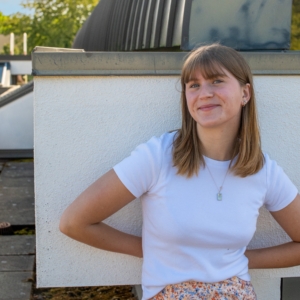 I am a settler from ᓀᐦᐃᔭᐤ ᐊᐢᑭᕀ Nêhiyaw-Askiy (Plains Cree), Anishinabewaki ᐊᓂᔑᓈᐯᐗᑭ, Očhéthi Šakówiŋ, Michif Piyii (Métis) and the Cree nation territory otherwise known as treaty Four territory, or rural Saskatchewan The lands of these peoples were unrightful taken by the Crown of KKKanada through the unfair and unlawful means of treaty. Treaties such as Treaty Four, continue to harm Indigenous communities to this day, and have been used since their signing to control, assimilate and harm Indigenous peoples.
I am a settler from ᓀᐦᐃᔭᐤ ᐊᐢᑭᕀ Nêhiyaw-Askiy (Plains Cree), Anishinabewaki ᐊᓂᔑᓈᐯᐗᑭ, Očhéthi Šakówiŋ, Michif Piyii (Métis) and the Cree nation territory otherwise known as treaty Four territory, or rural Saskatchewan The lands of these peoples were unrightful taken by the Crown of KKKanada through the unfair and unlawful means of treaty. Treaties such as Treaty Four, continue to harm Indigenous communities to this day, and have been used since their signing to control, assimilate and harm Indigenous peoples.
I grew up on these lands, unknowing of the harm, violence and suffering that people likeme have inflicted on Indigenous peoples. Now I know. It is unsettling to acknowledge that the foundation of the place I lived — and the country I identified with — is built on the bones of Indigenous peoples, and it should be. Growing up on a farm in rural Saskatchewan taught me to love the earth and the land, a privilege many Indigenous peoples have had ripped from their grasp. My connection to place has been shaped by this privilege, and my life is filled with privileges that continue to perpetuate harm to Indigenous communities.
Today, I live, work and study on the unceded, unsurrendered and stolen lands of the Lək̓ wəŋən (Songhees and Esquimalt) and WSÁNEĆ Peoples. When I moved to these lands I did not know treaties were not a part of history here. Now, I know that these lands are stained with blood. The work that I do with the UVSS must remain centered in decolonization to ensure that action is taken within the harmful institution to liberate Indigenous peoples, and us all. My studies of political science and writing must be steeped in Indigenous ways of knowing, being and doing in order to free myself from the westernization of education. In my life, work and study I commit myself to challenging what I think to be true, to learn from Indigenous peoples, their language and their stories.
Read Bunni’s Self Location
Bunni Williams, Director of Outreach & University Relations
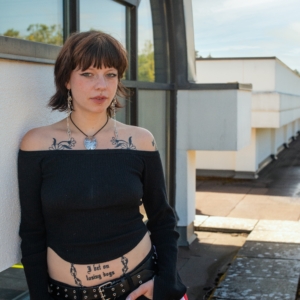
Taanishi, Bunni Williams Dishinihkasshoon – Hello, my name is Bunni Williams I am of Metis, Irish, Scottish, Ukrainian, and German descent. My fathers family name is Williams, and my mothers family name is Hutmacher. I am from the unceded territories of the q̓ ic̓əy̓ (Katzie), qʼwa:n̓ƛʼən̓ (Kwantlen), and Se-mi-ah-mu (semiahmoo) nations. I am able to reside on those territories because of the removal and attempted erasure of Indigenous peoples. I walk through this life with mindfulness of the privileges I have to live on their lands.
My grandparents on my fathers side are both Indigenous. My granny is from so called Saskatchewan while my papa was from the interior of so called B.C. Both of them were adopted and do not know their birth parents or family. My papa passed away before I could ask him about his family history and my granny is not one to share that intimate part of her life. They ran away from their adoptive homes together at the age of 12 and were married by the time they were 14. My papa worked at a car race track as a garage hand and worked evenings cleaning buildings to make ends meet. My granny cleaned with my papa in the evenings and took care of my dad and his sister during the day. They were incredibly hardworking individuals that I inspire to take their resilience and character alongside me in my life.
My grandparents on my mothers side are Irish, Scottish, Ukrainian and German. My Grandpa’s parents – who are German and Ukrainian – fled the Ukraine and took the trip over to so-called Saskatewan. My grandpa became an RCMP officer and worked on Indigenous reserves. My grandma’s parents are from Ireland and Scotland. They were raised in so called B.C and had my grandma in Powell river. My grandma also worked as an RCMP dispatch service provider. My mom’s family has very strong colonial ties to this land. It has been a very large battle for my identity having my parents’ families being the oppressor and the oppressed. I haven’t spoken to my grandpa about his time as an RCMP officer. By the time I was born he was fully retired and my grandma as well.
The history of Métis peoples amongst settlers and Indigenous peoples is complicated. We were called ‘half breeds’ by colonizers. We were seen as white enough to be adopted into colonial society however not white enough to have equal rights – a floating third identity that was left out of early treaty negotiations and subsequently our hunting, fishing and traditional rights to land. The Indian Act – which is still in place to this day – established a reality where there is no recognition of Métis rights. It took 106 years for Metis peoples to be recognized as Indigenous in Canada and have the same traditional rights as any Indigenous person and that wasn’t fully established until 2003.
With all this being said, this has obviously informed my identity and how I move in this world. I am on a road of self discovery and to embrace my Indigeneity. My family is complicated and our history to each other and this land even more so. I reflect on the privileges I was granted as a Métis person and as someone whose grandparents were RCMP officers and how those privileges contradict each other. I am intentional in my role at the UVSS to balance my lived experience as an Indigenous person and the privileges I am granted as a white passing person. I am honoured to serve my community and further along decolonization within my capacity. I hope to create a space for queer, indigenous folx to feel empowered to join the UVSS and to create a campus culture of radical love, compassion and honesty. My self location I believe is the first step to obtaining all three of those goals and now I have practice doing.
Read Hemal’s Self Location
Hemal Sharma, Director of Student Affairs
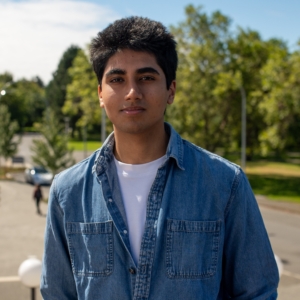
I come from a family of Punjabi immigrants who made their way to Canada. I grew up in Calgary, Alberta, on Treaty 7 land, the traditional territories of the Blackfoot Confederacy, including the Siksika, Kainai, and Piikani Nations, as well as the Tsuut’ina and Stoney Nakoda Nations. Growing up as a brown immigrant, I had to navigate what felt like two worlds—holding
onto my roots while trying to fit into the way of life surrounding me. Even though my family faced its own struggles as immigrants, I was still a settler on land that had been taken from Indigenous peoples. That realization made me question my place here and how, despite my own history of displacement, I’ve still benefited from the colonial systems that took this land.
My ancestors were from Punjab, a region that was split during the partition of India and Pakistan in 1947, a direct result of British colonialism. My family was forced to leave what is now Pakistan and rebuild their lives in India. That experience of losing land, home, and history has always been a topic of discussion at our dinner table. Stories of displacement and survival have shaped my family’s identity, and in many ways, they shaped my own view of the world and my place within it.
I now reside on the traditional lands of the lək̓ wəŋən (Songhees) people, along with the Esquimalt and WSÁNEĆ Nations, and have begun recognizing my own position as both a settler and someone impacted by colonialism elsewhere. I see decolonization as a personal and ongoing commitment. It’s about working toward dismantling the systems that I have benefited from and ensuring that the rights and lands of Indigenous peoples are respected and restored. This journey is continuous, and I know that my role is to actively engage in decolonization, both in my personal life and within the institutions I am part of.
To me this means listening to Indigenous voices, supporting their efforts for self-determination, and constantly questioning how I can be part of the solution, rather than passively benefiting from the problem.
Read Sarah’s Self Location
Sarah Buchanan, Director of Events
My name is Sarah Buchanan, and I am a white settler from Treaty Seven territory. This treaty covers a large portion of the Indigenous nations in the western prairies and eastern Rocky Mountains, including the Siksika, Kainai, Piikani, Stoney Nakoda, and Tsuu T’ina — specifically, I grew up on Tsuu T’ina territory, less than a block away from the reservation.
My family lineage is colonizers from eastern and western Europe — Scotland, Ireland, and Ukraine specifically. Each of them came to Turtle Island more than five generations ago. Being one of the earlier waves of colonizers – my families benefited greatly from the homesteading system. This allowed for settlers to stake a claim on the land that had been stolen from the indigenous populations, and assert their ownership. This structure allowed all sides of my family to settle in one region of the Canadian prairies or another — especially the western prairies, in regions that were incorporated into the Canadian state in 1905 as Saskatchewan and Alberta. Parts of my family also have deep ties to the Church. The name Buchanan comes from a parish in Scotland, literally meaning “house of the canon”. My ancestors would have come as missionaries as well as homesteaders, and contributed to the establishment of the Christian Church in Canada, which was integral to a number of colonial atrocities — two among them being culturally legitimising the colonial project, and establishing the residential schools that have enacted horrific violence upon the indigenous people of this land.
This history that I have told is not benign. It is a fact that, before Treaty Seven was signed, hordes of buffalo were slaughtered specifically because they were an essential source of food and raw materials for the Indigenous people of the prairies. Treaty Seven was signed by the Indigenous Nations, while at the same time, Indigenous communities had been massacred for their resistance, or crippled out by an engineered smallpox epidemic. There is a high likelihood that my ancestors participated in these atrocities. Certainly, they were helping to hold up the gun, if they weren’t pulling the trigger. My great-grandfather was a grain silo inspector, yes. But he was also a part of the effort that tore indigenous people from this land, and replaced them with European farmers.
And I continue to benefit from my ancestor’s participation in the homestead system. My parents were educated off of the money that their parents had, as were my grandparents, as am I. That is money made by the lucrative business of land theft, dispossession, and genocide. Later on, they worked in universities, healthcare, schools, and public policy — all systems born of the colonial structures earlier built by our ancestors. I am a colonizer, wholly the product and benefactor of these systems.
I am not proud of what my ancestors have done. I do not believe in holding people personally guilty for the atrocities committed by their parents, but I cannot pretend to be able to separate myself from the history of my family. Structurally, I am still invested in the subjugation of Indigenous communities, and if I am to shirk responsibility to right the wrongs of my ancestors, then I am to become no better than they were.
Read Khushi’s Self Location
Khushi Wadhwa, Director of Finance & Operations
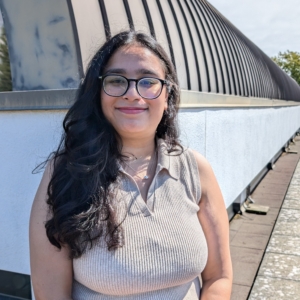
In Canada, I am a settler on the traditional territories of the Lək̓ wəŋən (Songhees) and WSÁNEĆ Peoples. Having the privilege of being on these lands, I recognize the space I hold in being a part of colonized systems and try to inculcate decolonizing practices. I have spent the majority of my life in India, a country that gained independence 77 years ago from the United Kingdom. As privileged as I feel to be a part of an independent country, it is hard to ignore the impact of colonization on our society, country, culture and how we show up and perceive the world.
The British took away our languages, our culture, our social practices, our identities- economic & cultural richness of our country; everything that made us the “sone ki chidia” (translated to the Golden Bird). They forced us to learn English and classified it as a superior language- which was only accessible to the wealthy and rich Indians. Our constitution was initially written in English (which meant it was inaccessible to most Indians at the time) and later translated into Hindi. They made us wear their clothes, grow their crops (we were forced to grow indigo which not only ruined the land for agriculture once harvested but also the crops went to the British and not to the farmers), export our spices and textiles- among other things.
To this day, English is recognized as a medium of imparting education, communicating in the corporate world and even for legal documents and proceedings. Some ways I try to include my roots in my daily life are by cooking Indian food, eating food with my hands, celebrating festivals with my friends (since I cannot be with my family back home), and talking to my parents in my mother tongue among other things.
Practicing and participating in decolonizing practices can look different for everyone but what I ask of every international student is to learn indigenous history, why we do land acknowledgements and what does your presence on these lands represent.
Calls to Action
Here are some calls to action from the Truth and Reconciliation report that relate to post-secondary education:
- We call upon the federal government to develop with Aboriginal groups a joint strategy to eliminate educational and employment gaps between Aboriginal and non-Aboriginal Canadians.
- We call upon the federal government to provide adequate funding to end the backlog of First Nations students seeking a post-secondary education.
- We call upon law schools in Canada to require all law students to take a course in Aboriginal people and the law.
- We call upon the federal, provincial and territorial governments, in consultation and collaboration with Survivors, Aboriginal Peoples and educators to:
- ii) Provide the necessary funding to post-secondary institutions to educate teachers on how to integrate Indigenous knowledge and teaching methods into classrooms.
- We call upon the federal government, through the Social Sciences and Humanities Research Council, and in collaboration with Aboriginal Peoples, post-secondary institutions and educators, and the National Centre for Truth and Reconciliation and its partner institutions, to establish a national research program with multi-year funding to advance understanding of reconciliation.
you can find the full Truth and Reconciliation Report and Calls to Action here: www.trc.ca
